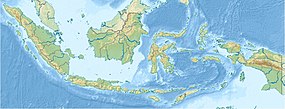The Wampu River is a river in North Sumatra, Indonesia, about 1500 km northwest of the capital Jakarta.[1]
| Wampu River | |
|---|---|
 Railway bridge over the River Wampu around 1920 | |
| Location | |
| Country | Indonesia |
| State | North Sumatra |
| Region | Karo Regency, Langkat Regency |
| Physical characteristics | |
| Source | Lau Biang |
| • location | Siberaya |
| Mouth | Strait of Malacca |
Hydrology
editIt rises as the Lau Biang River in Karo Regency near Siberaya, flowing past Kabanjahe, Perbesi, Kuta Buluh, Marike, and onto Bohorok in Langkat Regency, where the river is known as the Wampu. It flows past Stabat and Tanjung Langkat before emptying into the Strait of Malacca.[2] The Bohorok River is a tributary of the Wampu.
Much of the river valley was once fertile rainforest, but most has now been destroyed for logging and oil palm plantations.
Geography
editThe river flows in the northern area of Sumatra with a predominantly tropical rainforest climate (designated as Af in the Köppen-Geiger climate classification).[3] The annual average temperature in the area is 25 °C. The warmest month is August, when the average temperature is around 26 °C, and the coldest is December, at 24 °C.[4] The average annual rainfall is 2862 mm. The wettest month is October, with an average of 446 mm of rainfall, and the driest is June, with 129 mm of rainfall.[5]
See also
editReferences
edit- ^ Sungai Wampu at Geonames.org (cc-by); Last updated 2013-06-04; Database dump downloaded 2015-11-27
- ^ "Archived copy". Archived from the original on 2013-05-15. Retrieved 2010-10-31.
{{cite web}}: CS1 maint: archived copy as title (link) - ^ Peel, M C; Finlayson, B L; McMahon, T A (2007). "Updated world map of the Köppen-Geiger climate classification". Hydrology and Earth System Sciences. 11 (5): 1633–1644. Bibcode:2007HESS...11.1633P. doi:10.5194/hess-11-1633-2007. Retrieved 30 January 2016.
- ^ "NASA Earth Observations Data Set Index". NASA. 30 January 2016. Archived from the original on 10 May 2020. Retrieved 4 January 2019.
- ^ "NASA Earth Observations: Rainfall (1 month - TRMM)". NASA/Tropical Rainfall Monitoring Mission. 30 January 2016. Archived from the original on 19 April 2019. Retrieved 4 January 2019.

